film review: maps to the stars
Hollywood rarely turns the camera upon itself. If it does, Oscar-bait biopics about dead actors and filmmakers are usually the way it goes. Maps to the Stars, David Cronenberg’s latest exploration into the grotesqueness of the human condition, depicts the horrors of Hollywood’s narcissistic psyche, relishing in showcasing the demonic egomania and envy that fuels the modern movie business.
In a powerhouse performance that earned her Best Actress at this year’s Cannes Film Festival, Julianne Moore plays troubled fading star Havana Segrand. Haunted by her past and visions of her actress mother (Sarah Gadon) who perished in a fire when she was still young and beautiful, Havana is a tormented soul with a heart of stone. Seeing her star fading, she desperately attempts to be cast in a remake of her mother’s most loved film and she’ll let nothing get in her way of making it happen.
Havana hires a new personal assistant, Agatha (Mia Wasikowska), a peculiar young girl with scars all over her body and a mysterious past. Agatha befriends limo driver, Jerome (Robert Pattinson), an aspiring screenwriter, and the two embark on a bizarre relationship.
Elsewhere in Hollywood, fresh out of rehab 13-year-old actor Benjie Weiss (Evan Bird) is demanding to be paid more for the sequel of his hit movie “Bad Babysitter.” His just as horrible parents, “momanger” Christina (Olivia Williams) and celebrity therapist Stafford (John Cusack), spoil their son and let him do whatever he pleases. The dark and twisted lives of these characters intersect in a gruesome, grotesque fashion as the shiny lights of Hollywood stars take each other out one by one.
Slyly falling between a brutal self-immolation thriller and a pitch-black comedy with heaped servings of Cronenberg’s usual body horror, the film haunts your mind with imagery of soulless Hollywood hotspots, sterile mansions and obsessive materialism. As we move through Hollywood with these horrible, narcissistic characters, we see the disintegration of the human condition that Cronenberg so often depicts in his films. With esoteric dialogue referencing real-life filmmakers, celebrities and producers, some may get lost in the daze of Tinseltown dynamics, but that’s the point. The egocentrism of these characters, who are so unlikable and self-aware, form a film that’s like a car crash that you can’t look away from.
The Canadian-born Cronenberg made a name for himself in the 80s with gruesome body horror films like Videodrome and The Fly, and gained critical praise in 00’s with violent thrillers like A History of Violence and Eastern Promises. Maps to the Stars is his first comedy-drama and plays with the elements of brutal psychological character study last seen in his 2011 film A Dangerous Method.
As well as being a comment on egotism of Hollywood, Maps to the Stars also makes a comment on the role women play in Hollywood. In a career where women are valued for their looks, not their talents, an older actress like Havana is seen as worthless to both her female and male co-workers. Working with richly layered, monstrous and complex female characters like Havana and Agatha, both Moore and Wasikowska prove that they are two of the greatest actresses currently working. Their bravery in tackling roles that are both physically and mentally demanding is one of the major accomplishments of the film.
Even though it would have been easier to write a character like Havana – with her self-absorption and vindictiveness – in a misogynist manner, screenwriter Bruce Wagner – a Hollywood insider himself – presents her with deep complexities and troubles. And he does so in a way that we feel like we don’t need to sympathise with her, and she retains the notion of being pure evil in the most vain form.
Maps to the Stars plays out like the most horrific, bizarre and shocking nightmare you’ve ever had. It haunts you with not only its imagery, but the questions it poses about vanity, obsession and morality in the modern world. Unlike a horror movie, the characters, themes and events in Maps to the Stars are all very believable within the realm of Hollywood, and that is what makes the film all the more terrifying and grotesque. Some may find the film too eccentric or bizarre for their liking – many of Cronenberg’s films are an acquired taste – but the themes it tackles surrounding female villainy and narcissism are all too relatable and real.


